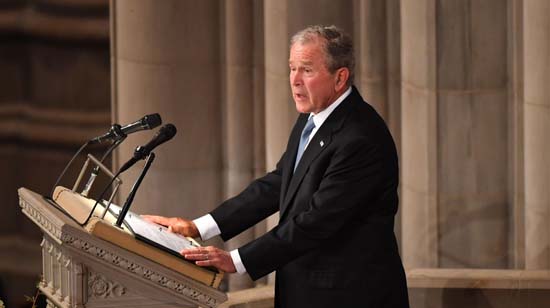
About halfway through Meghan McCain’s tribute to her father last Saturday in Washington, D.C, the director of TV coverage of Sen. John McCain’s funeral cut away to a shot of the middle rows of mourners in the National Cathedral.
Beyond the three former U.S. presidents – Obama, Bush and Clinton – and past the Republicans who wereinvited, sat row on row of American military people. They didn’t appear to be military brass, but relatively young Marine, Army, Navy and Air Force veterans seated in solemn tribute to their hero.
“Look at the military ribbons across those chests,” I thought, and then mused, “what a powerful statement of the man, the politician, the real state of America.”

When the camera switched back to Meghan McCain, the terribly grief-stricken daughter was just hitting her stride in her eulogy. She called her father’s death the passing of American greatness, appropriately pointing out her father’s service as a U.S. Navy pilot, shot down in the Vietnam war only to endure five years of torture, deprivation and attempted brainwashing at the hands of his captors.
But she hastened to compare her father’s stoic, steadfast patriotism to “men who will never come near the sacrifice, those that live lives of comfort and privilege while he suffered and served,” a clear and deft reference to the current president.
While she didn’t review Donald Trump’s military credentials, no doubt those mourners were reminded that the son of real-estate wealth, Donald went to New York Military Academy when he was 12, staying through his senior year in 1959. When he claimed he ascended to the leadership at the school, “in charge of all the cadets,” the Washington Post discovered he was removed from his position because he allowed hazing of the boys in his command.
He did not serve beyond the academy, receiving five deferments from the Vietnam draft, four for being at college and one medical one for bone spurs in his heels.
“The America of John McCain,” his daughter said, “has no need to be made great again, because America was always great.”
Amid the hymns, the prayers and eulogies offering appropriate commemoration for Sen. McCain (81 and just the 31st person to ever to lie in state this way) I think there emerged on Saturday a battle cry more powerful than even the lyrics of “The Battle Hymn of the Republic,” sung by the U.S. Naval Academy Glee Club choir that morning. “He hath loosed the fateful lightning of His terrible swift sword/His truth is marching on.”
The confluence of such emotion and push-back against the man currently running America, made those of us watching stop, feel moved, and even frightened at the intensity and power of the protest emerging.

Following McCain’s daughter, former president George W. Bush was escorted to the pulpit to speak in tribute, sometimes in memory of great debates they’d had during elections, sometimes over international policy, often as fellow Republicans crafting policy.
Bush said the senator always recognized, despite all, that his opponents were still patriots and human beings. It was perhaps Bush’s greatest piece of oratory. But it was also, I think, a throwing down of the gauntlet against the kind of isolationist, racist and inflammatory rhetoric Donald Trump has unleashed in nearly two years of administration.
And when president Bush said, “John (McCain) detested the abuse of power,” and that, “he could not abide bigots and swaggering despots,” was he alluding to Vladimir Putin and Kim Jong-un? Or perhaps a man just a few doors up the road on Pennsylvania Avenue?
“(McCain) respected the dignity inherent in every life – a dignity that does not stop at borders,” Bush said. Was Mr. Bush alluding to the Ural Mountains of Russia, or perhaps the Rio Grande and even the 49th Parallel. They were fighting words, I think.
Finally, the man who said he was truly surprised to be asked to speak at the funeral, former president Barack Obama, spoke more subtly, more theatrically, more lethally than any of the eulogists. The words he chose had little to do with patriotism and tribute, but more with fervency and challenge.

President Obama, whose name Mr. Trump doesn’t even know how to spell, laid out the clarity of John McCain’s America, a nation where anything is possible and where those who are citizens have an obligation to keep it that way.
“There are some things bigger than a party or ambition or money or fame or power,” Obama said. “There are some things that are worth risking everything for, principles that are eternal, truths that are abiding.”
As the funeral concluded, and I thought about the sorts of staged, campaign-like events President Trump addresses, in front of his base – rust-belt plants, gun lobbyists, and Republican hopefuls – I remembered the array of military ribbons of the mourners at Sen. John McCain’s funeral.
They – the so-called silent majority – may be the proverbial war chest that changes thinking, restores civility and turns the tide in the second half of Trump’s presidency.